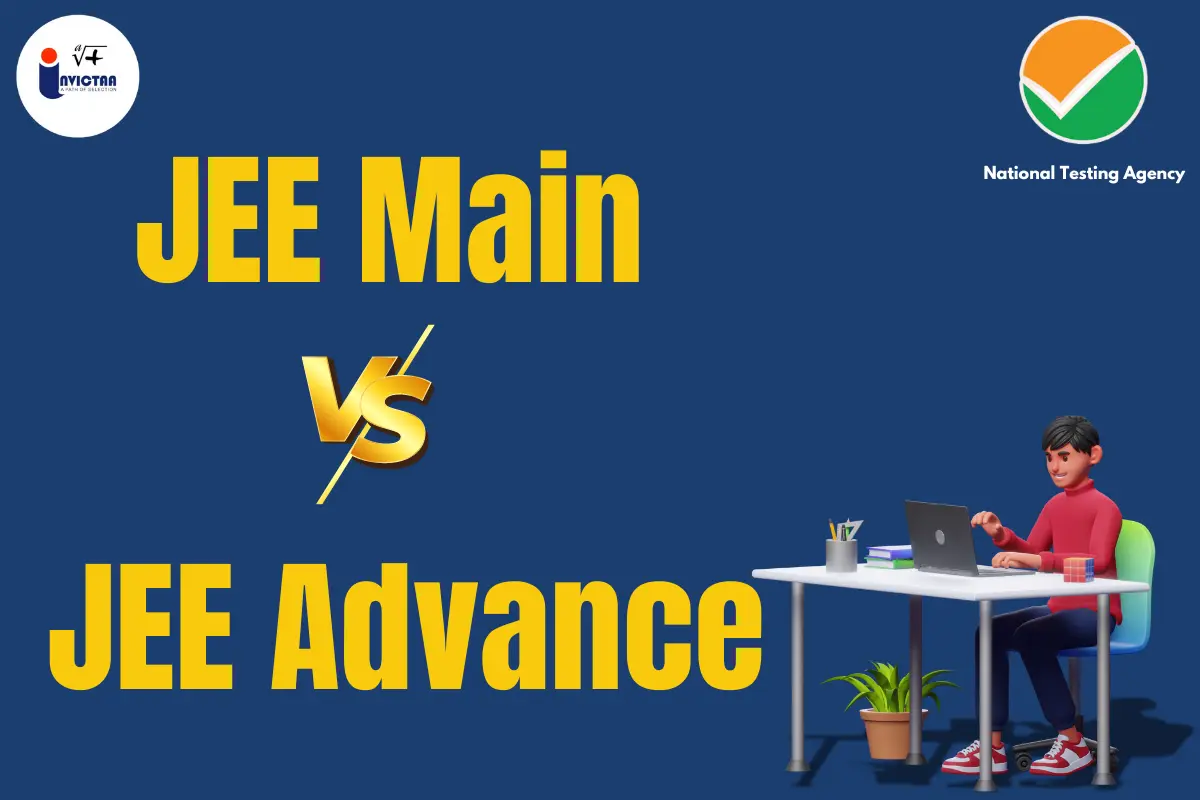Difference between JEE Main and JEE Advanced: The way to get admission into India’s top engineering institutions like IITs, NITs, etc usually requires passing two central exams JEE Main and JEE Advanced. Even though both enhance the careers of an aspirant, so knowing the Difference between JEE Main and JEE Advanced is crucial for exam perspective.
To enter an undergraduate program in a Top non-IIT engineering college, candidates have to clear the Entry test of the JEE Main exam which requires lots of effort and preparation,
To gain admission to direct IIT engineering college, candidates have to clear the JEE Advanced Exam. but now we will discuss what is the Difference between JEE Main and JEE Advanced in all aspects in detail.
Difference between JEE Main and JEE Advanced in Conducting Authority
The JEE is an entrance exam for the national level engineering which is conducted by the National Testing Agency, NTA. It helps aspirants to gain admission into courses like B.Tech, B.Arch, and many more. The JEE exam consists of two stages: the first one is JEE Main, and the other one is JEE Advanced. JEE Main opens the gates for admission to NITs and IIITs, and many Top non-IIT colleges,
Apart from this JEE Advanced is conducted by IITs on a rotation basis and must be taken to gain admission into India’s luxurious engineering colleges, IITs. Besides, IIT Kanpur is conducting JEE Advanced this year 2025. Although there are similarities between the two tests, they differ on several grounds as well. To know more about the Difference between JEE Main and JEE Advanced, kindly read the full article.
Difference between JEE Main and JEE Advanced in Eligibility Criteria
If you’re aiming for a career in engineering, it’s important to understand the eligibility criteria for both JEE Main and JEE Advanced. While both exams are key steps for getting into top institutes like NITs and IITs, the eligibility requirements for each exam are different. Here’s a breakdown of the Differences between the JEE Main and JEE Advanced in eligibility criteria.
JEE Main Eligibility
To gain admission to B.E. and B.Tech programs in NITs, IIITs, and other centrally funded institutions, candidates must first clear JEE Main. The eligibility criteria for JEE Main are as follows:
- Candidates must have passed their Class 12 board exams with relevant subjects, securing at least 75% marks for the general students and 65% for SC/ST students
- Candidates who rank in the top 20 percentile of their respective board exams are also eligible.
- those who have completed their 12th board exams within the last two years.
JEE Advanced Eligibility
To qualify for JEE Advanced, which is necessary for admission to IITs, candidates must meet the criteria. Only top performers from JEE Main can attempt this exam. The eligibility criteria include:
- Applicants must score within the top 2.5 lakh students in JEE Main.
- They should have passed their Class 12 board exams within the last two years.
Difference Between JEE Main and JEE Advanced in Number of Attempts
The number of attempts allowed for JEE Main and JEE Advanced is another key difference between the two exams. For those aspiring to get into top engineering institutions like NITs and IITs, it is essential to know how many chances they have to get to clear exams.
Number of Attempts in JEE Main
For JEE Main, candidates can give as many times as they want. The exam is held twice a year and an applicant can appear for both sessions in a year. If they feel that they can score better, they get an opportunity to sit for the test again in the next session.
Number of Attempts in JEE Advanced
An aspirant is allowed to attempt the exam a maximum of two times in two consecutive years. It means that an aspirant who qualifies for JEE Advanced in one year can try only the next year, and more attempts are not allowed after that two-year window. that’s why student should know the Difference between JEE Main and JEE Advanced for better preparation.
Difference between JEE Main and JEE Advanced in No. of Papers & Mode
When comparing those JEE Main and JEE Advanced, it’s important to measure the number of papers. Both exams have different formats designed for students focusing on various engineering courses. so having knowledge of the Difference between JEE Main and JEE Advanced is beneficial, These differences play a key role in how the exams are structured and what they assess.
JEE Main: Total Number of Papers & Exam Mode
The two papers are categorized based on the course through which the applicant applies.
- Paper 1 is for B.E./B. Tech, and conducted online using a computer-based test, CBT.
- Paper 2 is for B.Arch and B.Planning and is conducted offline with pen-and-paper examinations for students seeking entry into architecture as well as planning courses. The paper comprises sections to be answered in the form of drawing and planning skills.
- Number of Papers and Exam Mode Available in JEE Advanced JEE Advanced consists of two mandatory papers:
Paper 1 and Paper 2 are taken in online mode. To get admission to the IITs, applicants are required to appear in both papers. Those who want to pursue a B.Arch, have to pass both of these papers and then qualify for the Architecture Aptitude Test (AAT) to join architecture courses at IITs.
Difference between JEE Main and JEE Advanced in Syllabus
While subjects like Physics, Chemistry, and Mathematics form part of both JEE Main and JEE Advanced exams, the syllabus for both exams shows differences in terms of depth and coverage of topics. The Differences between JEE Main and JEE Advanced Syllabus are discussed below.
JEE Main Syllabus Overview
Topics under JEE Main Syllabus: The syllabus is based on the topics studied in Class 11 and 12 in the CBSE curriculum. It includes subjects like Physics, Chemistry, and Mathematics to high school concepts.
Some specific topics from JEE Main Syllabus are:
- Physics: Electronic Devices, Electromagnetic Waves, Communication Systems
- Math: Sets, Relations and Functions, Statistics and Probability, Trigonometry, Mathematical Reasoning, etc.
These subjects aren’t covered in the JEE Advanced syllabus and therefore smooth in coverage terms while competing at JEE Main.
Also read: JEE Main 2025
JEE Advanced Syllabus Overview
The JEE Advanced Syllabus builds upon the CBSE curriculum but additionally includes plenty of extra topics to go beyond the scope of JEE Main. Some of the additional topics that are included in JEE Advanced are:
- Physics: Thermal Physics, in which heat and temperature-related concepts are further explored.
- Chemistry: Electrochemistry is an in-depth concept
- that can provide a question that is slightly tough and not ordinary.
Difference between JEE Main and JEE Advanced FAQs
Q1 What is the Difference between JEE Main and JEE Advanced in eligibility criteria?
Ans For the JEE Main Exam students must pursue Class 12 and pass with 75% for general and 65% for SC/ST, while JEE Advanced requires candidates to be among the top 2.5 lakh scorers in JEE Main.
Q2 Is there any limit on the number of questions in JEE Main and JEE Advanced?
Ans Yes, JEE Main has a fixed number of questions, whereas JEE Advanced has variable patterns each year.
Q3 Which exam is more difficult, JEE Main or JEE Advanced?
Ans JEE Advanced is generally considered more difficult due to its complex questions with deeper concepts.





